www.aljazeerah.info
Opinion Editorials, September 2015
Archives
Mission & Name
Conflict Terminology
Editorials
Gaza Holocaust
Gulf War
Isdood
Islam
News
News Photos
Opinion Editorials
US Foreign Policy (Dr. El-Najjar's Articles)
www.aljazeerah.info
Pilgrims Throng the Plain of Arafat on Wednesday
Al-Jazeerah, CCUN, September 24, 2015
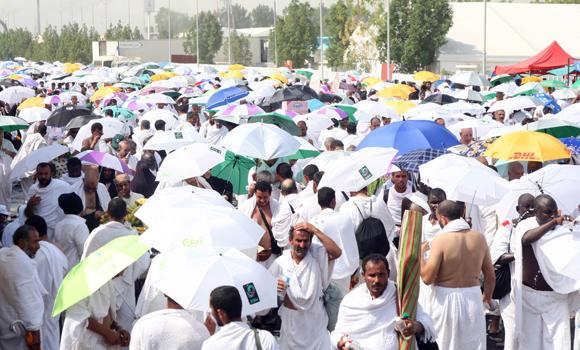 |
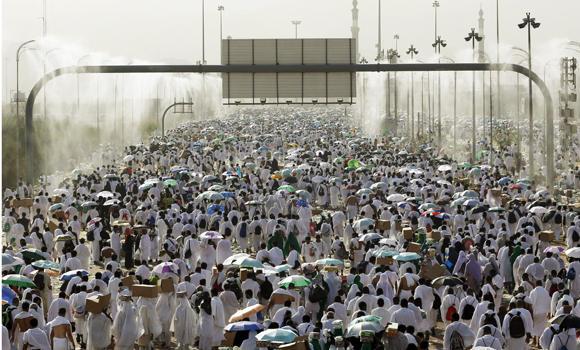 |
| Pilgrims gather in Arafat at
Haj climax (AN photo by Salman Marzouki) |
Pilgrims throng the plain of Arafat on Wednesday
SIRAJ WAHAB | ARAB NEWS STAFF
Arab News, Thursday 24 September 2015
ARAFAT: Nearly two millions pilgrims from 164 nations gathered on Wednesday on the plains of Arafat, about 20 km from Makkah, for what is described as the most important and central element of the five-day annual Haj pilgrimage.
The pilgrims began moving into Arafat from Mina on Tuesday night. They
took trains and buses to make the 14-km journey from Mina to Arafat. The
weather was very harsh and instead of the sea of white that is the usual
image during Haj, the multicolored umbrellas provided a different appearance
to the landscape.
Helicopters hovered overhead and it was only when one
got close to the Al-Namira Mosque that one had a clear sense of the millions
that are here for Haj. The pilgrims, especially men, packed the massive
mosque to listen to the Haj sermon delivered by Grand Mufti Abdul Aziz Al-Asheikh.
In the front row in the mosque was Makkah Gov. Prince Khaled Al-Faisal, wearing the two-piece mandated seamless white cloth. Outside the mosque, hundreds of thousands had lined up row after row in order to pray the combined Dhuhr and Asr prayers. It was a very dense crowd with every pilgrim lost in contemplation and reflection. They were beseeching Allah to forgive their sins of omission and of commission.
Most of the pilgrims, with their voices quivering, eyes moist and foreheads beady with perspiration, were praying for an easy life in the hereafter. Many women pilgrims also prayed for their children and grandchildren.
The pilgrims were thanking Allah for having provided them the means and
the physical strength to undertake the journey of a lifetime.
Rafe
Nayeemul Hassan from Bangladesh was happy beyond words. “Allah has been very
kind to me,” he said. “Only the lucky ones get to come here to this blessed
land.”
Hassan’s wife, Maimoona, was also ecstatically happy. “I feel as if a big load has been lifted from my back,” she said. “I feel light and exactly like a newborn. I have cleaned the slate of my past life and all that I do henceforth will be a new life. I will spend my life in the service of Allah who blessed us with seven children, all of whom are happily married and settled.”
Akram Ghannam, 45, from war-torn Syria, told AFP that being in Arafat is a feeling that cannot be described. “I pray to Allah to ease the pains of all those who are oppressed,” he said.
Naimatullah Jagirdar, from India, came to perform Haj for his late father. “He wanted to come for Haj three years ago. He applied but his name was not among those drawn in the lottery which selects the limited number of Indians who come. That very year, he died and while he was on his deathbed, I promised him that I would perform Haj on his behalf. And today I did.”
As he said those last words, he cried inconsolably. “This is the least I
could do for my late father,” he said, burying his face in his hands to hide
his tears.
Yawar Ali Qureshi, from Pakistan, was busy praying and
meditating on Jabal Al-Rahma, the Mount of Mercy. He recited verses from the
Holy Qur’an. “There are so many people here. Millions. But everyone is lost
in himself or herself. This is what it will be like on the Day of Judgment,”
he said. “Everyone will be worried because he/she will be accountable for
what they did in this world. Being here on this day is a blessing from
Allah. Now we get a chance to repent and to start a new life of piety and
good deeds,” said Qureshi.
“I got goosebumps, a feeling that cannot be explained, when I got to the top of Jabal Al-Rahma,” Ruhaima Emma, a 26-year-old Filipino pilgrim, told AFP. “I pray for a good life for everyone,” she said.
As the pilgrims stood in prayer at Arafat, millions of Muslims around the
world prayed for their safety and well-being. Photos of pilgrims from Arafat
and the live feeds on television channels moved the entire Ummah and they
turned to social media to congratulate the pilgrims on having made it to
Arafat. “O, Allah accept the prayers of the pilgrims,” wrote Ziyad Muammar,
a Twitter user from Egypt. “Just as the Muslims are united on the plains of
Arafat, may they be united everywhere on this planet.”
As the sun went
down, the pilgrims began the journey to Muzdalifa which is about 9 km from
Arafat. They will spend the night under the open skies, collect nearly 50
pea-sized pebbles and return to Mina on Thursday morning to perform the
other rituals, including the stoning of the devil.
***
Pilgrims throng Arafat for peak of Haj
-
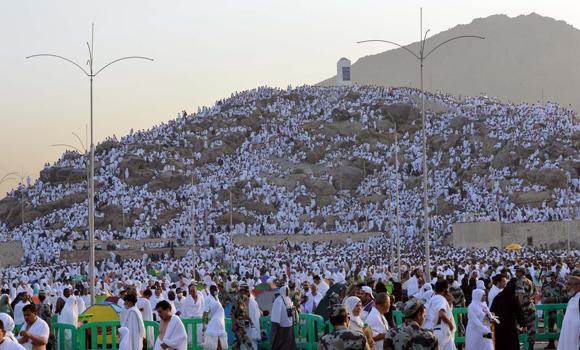
Pilgrims climb Mount Mercy on the plains of Arafat in Makkah during the annual Haj pilgrimage on Wednesday. (REUTERS)
Lynne Al-Nahhas | AFP
Arab News — Wednesday 23 September 2015
MOUNT ARAFAT:
Around two million white-clad Muslims
on Wednesday poured into the vast Saudi plain where
Prophet Muhammad had given his final sermon, for the
peak of the Haj pilgrimage.
Many of the faithful from
around the globe camped at the foot of Mount Arafat
where they slept, exhausted from their journey, and
prayed despite the scorching sun.
Carrying colorful
umbrellas, they walked from dawn in massive crowds
toward the slippery, rocky hill which is also known as
Mount Mercy.
It was here that the Prophet gave his
final sermon 14 centuries ago after leading his
followers on Haj.
To organize the flow of pilgrims,
security forces formed human chains along the roads of
the vast Arafat plain.
Along the way, volunteers
handed out boxes of food and cold water bottles.
For
many pilgrims, Haj is the spiritual highlight of their
lives.
“We feel blessed. I got goosebumps, a feeling
that cannot be explained, when reaching the top of the
mountain,” said Ruhaima Emma, a 26-year-old Filipino
pilgrim, who said she has been “praying for a good life
for everyone.”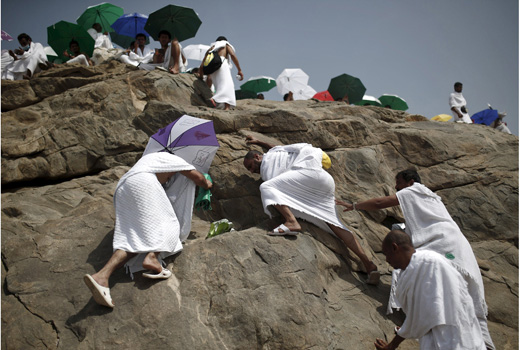
For Akram Ghannam, 45, from war-torn Syria, being in
Arafat is a “feeling that cannot be described. I pray to
God for the victory of all those who are oppressed.”
Many reached Arafat by bus while some walked from the
holy city of Makkah about 15 kilometers (nine miles)
away.
Other pilgrims arrived from nearby Mina using
the elevated Mashair Railway linking the holy sites of
Arafat, Muzdalifah and Mina, a tent city where many
pilgrims spent Tuesday night.
After sunset on
Wednesday they will move to Muzdalifah. There they will
gather pebbles for a symbolic stoning of the devil
ritual on Thursday, which is also the Eid Al-Adha feast
of sacrifice marked by the world’s more than 1.5 billion
Muslims.
Undeterred by crane accident
This year’s gathering is about the same size as last
year’s, with 1.4 million foreign pilgrims joining
hundreds of thousands of Saudis and residents of the
kingdom.
They are undeterred by a construction crane
collapse at the Grand Mosque earlier this month that
killed 111 people, including foreign pilgrims.
About
400 people were injured by the crane which was working
on an expansion of Islam’s holiest
site.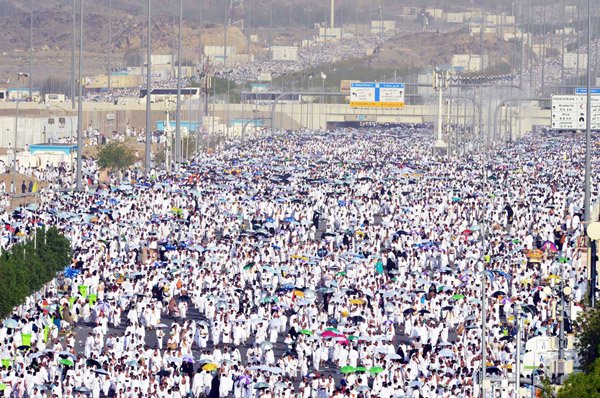
Previously marred by stampedes and fires that killed
hundreds, the pilgrimage had been largely incident-free
for the past nine years after safety improvements.
The Haj is among the five pillars of Islam and every
capable Muslim must perform it at least once in a
lifetime.
This year’s gathering takes place against a
backdrop of increased extremist violence in some Muslim
countries, a surge of the potentially deadly MERS virus
and the war in Yemen.
About 100,000 police have been
deployed to secure pilgrimage sites and manage the
crowds.
Authorities say they are on alert for
possible attacks by extremists, after Daesh terrorists
bombed security forces and Shiite mosques in the kingdom
in recent months.
Among other challenges facing Saudi
authorities is potential transmission of the deadly
Middle East Respiratory Syndrome coronavirus (MERS-CoV).
Riyadh saw a jump in infections last month, but health
officials say there has never been a case of MERS
infection among pilgrims.
The health ministry has
mobilized thousands of medical workers to help ensure a
virus-free pilgrimage and to care for routine ailments.
Pilgrims began the Haj on Tuesday by entering ihram, a
state of purity in which they must not quarrel, wear
perfume, or cut their nails or hair.
During ihram,
men wear a seamless two-piece shroud-like white garment,
while women must wear loose dresses, generally also
white, exposing only their faces and hands.
The
clothing emphasizes their unity, regardless of whether
they spend the Haj in Makkah’s five-star hotels or in
shabby highrise hostels.
“I’m hoping for mercy and
that Allah accepts our prayers,” said Pakistani pilgrim
Abdeghafour Abu Bakr, 38, who came with friends.
***
Share this article with your facebook friends
|
|
|
|
||
|
||||||


